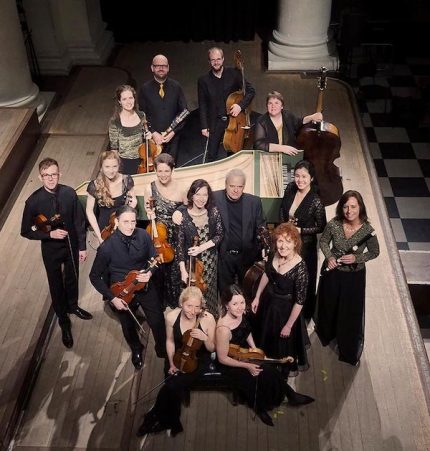Apollo’s Fire lights a winter blaze with lively Bach and Vivaldi

The Cleveland-based Apollo’s Fire is celebrating is 30th anniversary season in 2022. This year the early music ensemble is also presenting its inaugural Windy City Series, bringing three programs to Chicago audiences under the leadership of founder and artistic director Jeannette Sorrell.
Sorrell and company presented their second season event Saturday night at the Music Institute of Chicago in Evanston, offering compelling accounts of familiar Vivaldi and Bach concertante works to follow up their dynamic Four Seasons in October.
There is a psychoanalytic concept called Nachträglichkeit, which translates loosely as “afterwardness” and conveys how the meaning of past experiences is altered and shaped by later ones. The revelatory account of Bach’s Brandenburg Concerto No. 3 that opened Saturday night’s performance constituted such an experience.
The nuance and vitality that Apollo’s Fire brought to Bach’s familiar opus made one realize just how many seemingly adequate past performances were, in hindsight, casual and pro forma. Sorrell and colleagues’ reading was bustling and highly inflected, though never mannered, and highlighted contrapuntal details that breathed necessary freshness into the oft-traversed score.
The performance continued with Bach’s Violin Concerto in D Minor, with the Juilliard-trained Spaniard Francisco Fullana as soloist. The Violin Concerto’s original manuscript has been lost, so the solo violin part needs to be reconstructed from the surviving version for solo harpsichord, work Sorrell suggested in some brief remarks that Fullana had newly undertaken himself in this instance.
Saturday night Fullana was wearing a frilly shirt, sparkling Louboutin loafers (“red bottoms”), and flowing silky pants. Fullana’s sartorial choices reflected the general impression of his Bach—accomplished, maybe even stylish, but often dangerously flirting with the outer limits of good taste. A work such as this should perhaps sound like Prokofiev in spirit but certainly not in fact, and Fullana’s crunchy double-stops and aggressive virtuosity came off as unsubtle and indulgent. There was little to argue with in terms of technique, however, and Fullana did find genuine moments of pathos in the central Adagio, his over-the-top aesthetic a distraction from these finer elements.
Cellists René Schiffer and Ezra Seltzer took the solo reins for Vivaldi’s Concerto in G Minor for Two Cellos. Their playing in the opening Allegro felt thrillingly impetuous, they highlighted the close dissonances of the ensuing Largo, and the off-kilter rhythms of the closing movement danced under Sorrell’s leadership. In some short comments, Sorrell drew attention to Vivaldi’s influence on Bach, particularly with regard to concerto writing, and this cross-pollination was evident throughout the evening.
Apollo’s Fire principal flutist Kathie Stewart was in the spotlight for three movements from Bach’s Orchestral Suite No. 2 in B Minor, performing on traverso (think Baroque flute, closer to a recorder than a modern metal instrument). Stewart’s playing was exceptional, her supple tone blending with her string colleagues while still projecting in the Overture, Rondeau, and Badinerie. It was particularly informative to hear the B Minor Suite on a period instrument—modern flutes have little problem cutting through a small ensemble of strings, while the woody timbre of the traverso creates an overall darker sonority, that in fact sounds more appropriate to the harmonic vein in which Bach writes.
Last up was Vivaldi’s Concerto in A Minor for Two Violins, with co-concertmaster Alan Choo (filling in for “1st concertmaster” Olivier Brault) and associate concertmaster Susanna Perry Gilmore in the solo roles. Choo and Gilmore were fiery soloists, bringing dynamic esprit and flashiness to their solo parts that still felt appropriate to the score’s period and scale. Here as throughout, Sorrell’s leadership was unfussy but assertive, allowing her players ample freedom while still keeping her hands on the reins.
As an encore, Apollo’s Fire gave a breakneck reading of the Turkish “Nihavend longa,” with violinists Cullana, Choo, and Emi Tanabe taking solos, and Sorrell herself picking up the tambourine. Tanabe took a particularly extended, personality-plus solo turn, and the evening ended in a lively, party atmosphere.
Apollo’s Fire returns to Chicago May 13 and 14 for “Mozart and the Chevalier,” with performances at DePaul and the Music Institute of Chicago, respectively. apollosfire.org
Posted in Uncategorized


